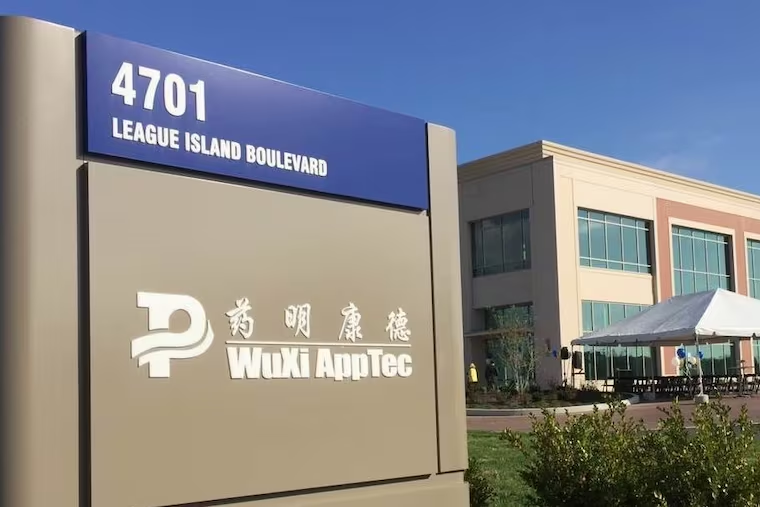China-based WuXi AppTec wins $19M from taxpayers for giant Delaware drug plant
Delaware has voted up to $19 million in "capital development" and jobs grants and may add $2 million for roads for Shanghai-based WuXi AppTec, which employs 600 in Philly.

WuXi AppTec, a Chinese-owned pharma company that already runs Philadelphia’s largest cell and gene therapy factory, on Monday was awarded $19 million in state investment and job training grants to build “Project Dragonfly,” a much larger pill factory, with labs and offices, on farmland in northern Delaware.
WuXi will decide by mid-July whether it will choose the 190-acre site in the industrial boom town of Middletown, west of Wilmington and about 20 miles south of the Pennsylvania state line, according to Dean Childers, a veteran pharmaceuticals executive who will head the new plant. The company hopes to hear before then about an additional $2 million state grant to improve roads on the site. The firm would not disclose the location of a second site under consideration.
The proposed 1.7 million-square-foot complex — bigger than Philadelphia’s largest office towers — would house a factory for WuXi’s STA pharmaceuticals division. It would be WuXi AppTec’s largest U.S. manufacturing facility, more than triple the size of its Advanced Therapies Unit Navy Yard complex in South Philadelphia, and dwarfing its lone U.S. pill factory in San Diego.
WuXi would add about 500 employees there by 2024, with pay starting at about $40,000 a year, Childers said. That first phase of construction would cost $510 million, according to WuXi’s heavily redacted application for public aid.
» READ MORE: Biomanufacturing: These 30 gene-therapy firms employ more than 3,000 in Philly area
The site would eventually house 1,200, said Kenneth L. Branner Jr., mayor of Middletown, which is also home to a large Amazon distribution center and Johnson Controls plant, among others. WuXi employs about 600 in Philadelphia and an affiliate employs about 50 in King of Prussia. The Middletown plant would hire factory operators, lab technicians, quality-control staff, scientists, managers and warehouse workers.
The WuXi plan shows that the region can still attract big factories.
“There are tons of sites” in the Philadelphia area, but WuXi “had very specific requirements,” given the scope of its project, said Meghan Kelly, director for life sciences of Select Greater Philadelphia, a business group that helped steer WuXi to Middletown.
“This is strictly a manufacturing opportunity, one we have been looking for, for many years,” marveled Delaware State Sen. Nicole Poore, a Democrat and one of several lawmakers who spoke in favor of the subsidies at a meeting of the Delaware Council on Development Finance, which approved the project unanimously.
The vote followed comments from just a handful of residents, including Amy LePore, vice chair of the state Libertarian Party, who said small-business owners and other taxpayers “should absolutely not be asked to subsidize a foreign pharmaceutical company.”
LePore noted that some other large projects subsidized by the state failed to produce promised jobs.
Why Middletown? “There was a site of the right size, zoned appropriately, But it comes down to knowing Middletown would work with them in a judicious way,” said Kurt Foreman, CEO of the Delaware Prosperity Partnership, a state-backed, privately run group that arranges public aid for prospective Delaware employers.
He noted that Middletown’s pro-growth mayor, Branner, “has been in office 32 years, and his council is in sync, and they have a longtime road infrastructure plan to [finance] roads that can accommodate more growth.” That means connecting industrial property on the city’s west side north to I-95, and gathering commuters “from elsewhere in Greater Philadelphia.”
WuXi AppTec employs about 27,000 at 30 sites in Asia, Europe and America, including 1,700 at nine facilities in seven U.S. states. Middletown would be the eighth worldwide site for the STA manufacturing division.
Gov. John Carney expects that WuXi STA would attract more biotech investment to lower New Castle County, the southern edge of the Philadelphia metro region. Pennsylvania and New Jersey are home to thousands of workers for Merck, GSK, Johnson & Johnson, and other big drugmakers, as well as biotech start-ups clustered around Penn, Jefferson and other medical schools.
Lawmakers who supported the project urged WuXi to hire local contractors and workers for the job. “We hear often when these projects are being built, it’s all out-of-state license tags in the parking lot,” complained State Rep. Ed Osienski, a Democrat and retired business agent for a construction union.
“It is our goal to use local labor in the construction phase,” Childers affirmed.
The state package includes $15.3 million for construction and $3.5 million to train workers, as well as $2 million to improve roads expected from the Delaware Department of Transportation.
WuXi, founded in Shanghai 20 years ago by Ge Li, a Columbia-trained chemistry Ph.D., manufactures medical treatments on contracts for Pfizer, Roche and other big drug companies, and also serves research clients at Harvard, the University of Pennsylvania, and other academic institutions whose business-minded doctors are hatching gene and cell therapy start-up companies but need someone to make the products in larger volumes than a college lab can handle.